I am seeing constant deadlocks in my app, even though it performs no select statements, no delete statements, and no update statements. It is only inserting completely new data.
TL;DR: It seems to be related to the foreign key. If I remove that then I don't get any deadlocks at all. But that is not an acceptable solution for obvious reasons.
Given the following table structure
CREATE TABLE [dbo].[IncomingFile]
(
[Id] UNIQUEIDENTIFIER NOT NULL,
[ConcurrencyVersion] RowVersion NOT NULL,
CONSTRAINT [PK_IncomingFile] PRIMARY KEY CLUSTERED([Id])
)
GO
CREATE TABLE [dbo].[IncomingFileEvent]
(
[Id] UNIQUEIDENTIFIER NOT NULL,
[ConcurrencyVersion] RowVersion NOT NULL,
[IncomingFileId] UNIQUEIDENTIFIER NOT NULL,
CONSTRAINT [PK_IncomingFileEvent] PRIMARY KEY CLUSTERED([Id]),
CONSTRAINT [FK_IncomingFileEvent_IncomingFileId]
FOREIGN KEY ([IncomingFileId])
REFERENCES [dbo].[IncomingFile] ([Id])
)
GO
When I hit a number of concurrent tasks inserting data, I always see a deadlock. READ_COMMITTED_SNAPSHOT is enabled in my DB options (even though I am not reading anyway).
Here is the code that will reproduce the problem. If you do not experience the problem, increase the NumberOfTasksPerCpu constant at the top of the program.
using System;
using System.Collections.Generic;
using System.Data.SqlClient;
using System.Diagnostics;
using System.Text;
using System.Threading;
using System.Threading.Tasks;
namespace SqlServerDeadlockRepro
{
class Program
{
private const int NumberOfTasksPerCpu = 8; // Keep increasing this by one if you do not get a deadlock!
private const int NumberOfChildRows = 1_000;
private const string MSSqlConnectionString = "Server=DESKTOP-G05BF1U;Database=EFCoreConcurrencyTest;Trusted_Connection=True;";
private static int NumberOfConcurrentTasks;
static async Task Main(string[] args)
{
NumberOfConcurrentTasks = Environment.ProcessorCount * NumberOfTasksPerCpu;
var readySignals = new Queue<ManualResetEvent>();
var trigger = new ManualResetEvent(false);
var processingTasks = new List<Task>();
for (int index = 0; index < NumberOfConcurrentTasks; index++)
{
var readySignal = new ManualResetEvent(false);
readySignals.Enqueue(readySignal);
var task = CreateDataWithSqlCommand(trigger, readySignal);
processingTasks.Add(task);
}
Console.WriteLine("Waiting for tasks to become ready");
while (readySignals.Count > 0)
{
var readySignalBatch = new List<WaitHandle>();
for(int readySignalCount = 0; readySignals.Count > 0 && readySignalCount < 64; readySignalCount++)
{
readySignalBatch.Add(readySignals.Dequeue());
}
WaitHandle.WaitAll(readySignalBatch.ToArray());
}
Console.WriteLine("Saving data");
var sw = Stopwatch.StartNew();
trigger.Set();
await Task.WhenAll(processingTasks.ToArray());
sw.Stop();
Console.WriteLine("Finished - " + sw.ElapsedMilliseconds);
}
private static int TaskNumber = 0;
private static async Task CreateDataWithSqlCommand(ManualResetEvent trigger, ManualResetEvent readySignal)
{
await Task.Yield();
using var connection = new SqlConnection(MSSqlConnectionString);
await connection.OpenAsync().ConfigureAwait(false);
var transaction = (SqlTransaction)await connection.BeginTransactionAsync(System.Data.IsolationLevel.ReadCommitted).ConfigureAwait(false);
Console.WriteLine("Task " + Interlocked.Increment(ref TaskNumber) + $" of {NumberOfConcurrentTasks} ready ");
readySignal.Set();
trigger.WaitOne();
Guid parentId = Guid.NewGuid();
string fileCommandSql = "insert into IncomingFile (Id) values (@Id)";
using var fileCommand = new SqlCommand(fileCommandSql, connection, transaction);
fileCommand.Parameters.Add("@Id", System.Data.SqlDbType.UniqueIdentifier).Value = parentId;
await fileCommand.ExecuteNonQueryAsync().ConfigureAwait(false);
using var fileEventCommand = new SqlCommand
{
Connection = connection,
Transaction = transaction
};
var commandTextBulder = new StringBuilder("INSERT INTO [IncomingFileEvent] ([Id], [IncomingFileId]) VALUES ");
for (var i = 1; i <= NumberOfChildRows * 2; i += 2)
{
commandTextBulder.Append($"(@p{i}, @p{i + 1})");
if (i < NumberOfChildRows * 2 - 1)
commandTextBulder.Append(',');
fileEventCommand.Parameters.AddWithValue($"@p{i}", Guid.NewGuid());
fileEventCommand.Parameters.AddWithValue($"@p{i + 1}", parentId);
}
fileEventCommand.CommandText = commandTextBulder.ToString();
await fileEventCommand.ExecuteNonQueryAsync().ConfigureAwait(false);
await transaction.CommitAsync().ConfigureAwait(false);
}
}
}
UPDATE
Also tried making the primary key NONCLUSTERED and adding a CLUSTERED index based on the current date and time.
CREATE TABLE [dbo].[IncomingFile]
(
[Id] UNIQUEIDENTIFIER NOT NULL,
[ConcurrencyVersion] RowVersion NOT NULL,
[CreatedUtc] DateTime2 DEFAULT GETDATE(),
CONSTRAINT [PK_IncomingFile] PRIMARY KEY NONCLUSTERED([Id])
)
GO
CREATE CLUSTERED INDEX [IX_IncomingFile_CreatedUtc] on [dbo].[IncomingFile]([CreatedUtc])
GO
CREATE TABLE [dbo].[IncomingFileEvent]
(
[Id] UNIQUEIDENTIFIER NOT NULL,
[ConcurrencyVersion] RowVersion NOT NULL,
[IncomingFileId] UNIQUEIDENTIFIER NOT NULL,
[CreatedUtc] DateTime2 DEFAULT GETDATE(),
CONSTRAINT [PK_IncomingFileEvent] PRIMARY KEY NONCLUSTERED([Id]),
CONSTRAINT [FK_IncomingFileEvent_IncomingFileId]
FOREIGN KEY ([IncomingFileId])
REFERENCES [dbo].[IncomingFile] ([Id])
)
GO
CREATE CLUSTERED INDEX [IX_IncomingFileEvent_CreatedUtc] on [dbo].[IncomingFileEvent]([CreatedUtc])
GO
UPDATE 2
I tried a sequential guid taken from here, which made no difference.
UPDATE 3
It seems to be related to the foreign key. If I remove that then I don't get any deadlocks at all.
UPDATE 4
A reply from Sql Server Product Group with some suggestions has been posted on my original github issue.
https://github.com/dotnet/efcore/issues/21899#issuecomment-683404734

